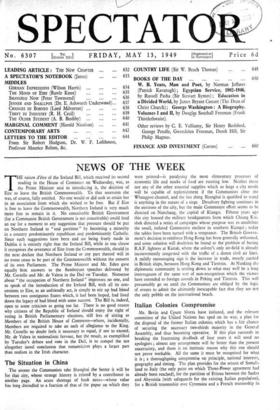NEWS OF THE WEEK
THE raison d'être of the Ireland Bill, which received its second reading in the House of Commons on Wednesday, was, as the Prime Minister said in introducing it, the decision of Eire to leave the British Commonwealth. To that secession she was, of course, fully entitled. No one would or did seek to retain her in an association from which she wished to be free. But if Eire is free to leave the Commonwealth, Northern Ireland is very much more free to remain in it. No conceivable British Government (for a Communist British Government is not conceivable) could lend an ear for a moment to any suggestion that pressure should be put on Northern Ireland to "end partition" by becoming a minority in a country predominantly republican and predominantly Catholic. Since such suggestions have been and are being freely made in Dublin it is entirely right that the Ireland Bill, while in one clause it recognises the severance of Eire from the Commonwealth, should in the next declare that Northern Ireland or any part thereof will in no event cease to be part of the Commonwealth without the consent of its own Parliament. The Prime Minister and Mr. Eden gave equally firm answers to the flamboyant speeches delivered by Mr. Costello and Mr. de Valera in the Dail on Tuesday. Nonsense about "the occupation of Northern Ireland" impresses no one, and to speak of the introduction of the Ireland Bill, with all its con- cessions to Eire, as an unfriendly act, is simply to stir up bad blood between two contiguous States which, it had been hoped, had lived down the legacy of bad blood with some success. The Bill is, indeed, open to some criticism as going too far. There is no good reason why citizens of the Republic of Ireland should enjoy the right of voting in British Parliamentary elections, still less of sitting as Members of the British House of Commons—where, incidentally, Members are required to take an oath of allegiance to the King. Mr. Costello no doubt feels it necessary to equal, if not to exceed, Mr. de Valera in nationalistic fervour, but the result, as exemplified by Tuesday's debate and vote in the Dail, is to compel the not altogether novel conclusion that romanticism plays a larger part than realism in the Irish character.






































